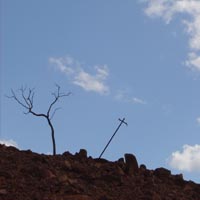www.room40.org
 |
Ghost Towns is not a field recording, the raw sound is gently treated, but it still sounds like a specific place with specific objects being plucked, struck, or listened to. Like Dziga Vertov with Kino Pravda, English gets at the audio truth through all the possible means and techniques of recording (as against the means and techniques of signal processing).
Sometimes Ghost Towns is up close, everything in your face. Other times it’s spacious, drones in the back, discrete sounds up front. The start is quiet, big gong drum, space between the sounds, insects, birds, and shaky, rattling somethings over a low drone of wind rumble or maybe a distant plane. Some crummy setting-up-the-mic interference noise. The mic and plane take Ghost Towns away from that nostalgic space that deletes the artificial, separates humans from animals, and sees us as noisy intruders.
Another gong, another section break, and into plunky metallic sounds like bike spokes and walking about on old tin. Space has settled into a mid versus close recording, the sound stage shallow compared to the opening. This middle section seems to be about doing something with whatever was at hand, about performing the ghost town.
Scratches and crinkles start to pan about from left to right. In the background metal plates bang like gongs again. Suddenly a great creaking Scooby Doo door right up front and loud, then back into spacious sound. Cockatoos squawk, cicadas drone loud and loud and loud enough to kill. Back to plinking spokes, wires, the interior of an abandoned piano. "Can’t get it on the truck. You never played it anyway. Let’s go." Dust on the verandah. Rust on the tin. Bass strings flap around, roll down low then stop–like a dead town.
Greg Hooper
© Greg Hooper; for permission to reproduce apply to [email protected]








 back
back